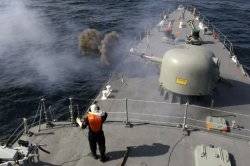US vows to stay in Gulf despite Iran warning
04/01/2012| IslamWeb
The Pentagon has responded to an Iranian warning to keep US aircraft carriers out of the Arabian Gulf by declaring that US warships will continue regularly scheduled deployments to the strategic waterway.
George Little, the Pentagon press secretary, said on Tuesday that the navy operates in the Gulf in accordance with international law and to maintain "a constant state of high vigilance" to ensure the flow of sea commerce.
Earlier in the day, Iran's army chief warned an American aircraft carrier not to return to the Gulf. Iran has also warned it could block one of the world's key oil tanker sea lanes in response to economic pressures.
Jay Carney, the White House press secretary, dismissed Iran's warnings as signs of Tehran's weakness and of the international isolation it has faced for pursuing a nuclear programme.
"It's the latest round of Iranian threats and is confirmation that Tehran is under increasing pressure for its continued failure to live up to its international obligations," Carney said. "Iran is isolated and is seeking to divert attention from its behavior and domestic problems."
The US navy has said the aircraft carrier USS John C Stennis and another vessel left the Gulf through the Strait of Hormuz a week ago.
Strategic channel
Iran has been holding naval exercises since then near the strait at the mouth of the Gulf, which is a critically important passage for international oil supplies.
"The deployment of US military assets in the Persian Gulf region will continue as it has for decades," Little said in a written statement.
"These are regularly scheduled movements in accordance with our longstanding commitments to the security and stability of the region and in support of ongoing operations."
The US Navy Fifth Fleet has long been headquartered in the Gulf state of Bahrain.
Asked whether the US intends to send naval reinforcements to the Gulf in response to Iranian talk of closing the Strait of Hormuz, Little did not answer directly but said, "No one in this government seeks confrontation over the Strait of Hormuz. It's important to lower the temperature."
Little reiterated that any closure of the strait would not be tolerated, but he declined to elaborate.
Iran test-fired a surface-to-surface cruise missile on Monday as part of its naval maneuvers in the Gulf, prompting Iran's navy chief to boast that the strait is "completely under our control".
Asked about the significance of the missile test, Little said: "We are aware of reports of missile tests that are apparently tied to Iranian naval exercises that began in late December. They have the right to conduct exercises."
Little said the US believes that the "Iranian regime should devote its energy and resources to establishing friendly relations with countries in the Gulf region".
Juppe's remarks
Against this backdrop of tensions in the Gulf, Alain Juppe, the French foreign minister, has urged the international community to adopt tougher sanctions on Iran.
He told French broadcaster ITV on Tuesday that "there is no doubt" that Iran is pursuing the development of nuclear weapons, saying the last report from the International Atomic Energy Agency (IAEA) had been "quite explicit on this subject".
Iran denies that its nuclear programme is aimed at producing weapons, insisting it is for peaceful purposes only, such as generating electricity.
The IAEA report, published in November, concluded that some alleged clandestine work by Iran could not be used for any other purpose than making nuclear arms.
"This is the reason why France has blocked all dialogue and negotiations with Iran and of course imposed tougher sanctions," Juppe said.
"The French president has put forward two proposals: the first one is a freezing of the assets of Iran's central bank - which would be a very harsh measure - and the second is an embargo on Iranian oil exports."
PHOTO CAPTION
Iran has been conducting military exercises in the Strait of Hormuz for nearly a week.
Aljazeera

